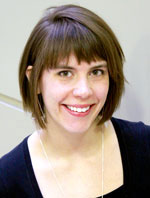Sinking Her Teeth into the Research
By Kristin Trelstad on

When Shawnda Schroeder, PhD, started her research on oral health in North Dakota, the data was startling. Three years later, she can say there is immense hope for the State's oral health needs.
"We see how dire this all is. But at the same time we see a lot of hope," Schroeder said. "This research has brought together so many energetic, insanely intelligent, and really driven and passionate individuals who are all working together to fix these issues."
This research has brought together so many energetic, insanely intelligent, and really driven and passionate individuals who are all working together to fix these issues.
More than 50 different organizations in the state of North Dakota have come together in the last few years to talk about what the State's oral health needs are, and what they can do to fix the issues.
Out of North Dakota's 53 counties, 17 do not have a practicing dentist. This fact is just one of the issues facing oral health Statewide. Currently, North Dakota has one of the highest Medicaid reimbursement rates in the country, but as for dental treatment for Medicaid enrollees, the state is ranked third from the bottom.
"You would hope that we would at least be at the national average for the percent of our Medicaid enrollees having preventative visits, or sealants," Schroeder said. "But that's not the case."
Schroeder believes one of the biggest issues the State faces regarding oral health is getting its residents to understand the importance of dental care.
Schroeder shared that only 4 percent of all white non-Hispanic third graders in North Dakota do not have a toothbrush at home. Comparably, 51 percent of American Indian third graders are without a toothbrush in the home.
Oral health is far more than just the condition of the teeth…it's more than just physical appearance.
"Oral health is far more than just the condition of the teeth…it's more than just physical appearance," Schroeder said. "…Workforce initiatives to increase access to care are great, but it we don't have oral health literacy – and these children don't even have a toothbrush in the home – we have a much longer road ahead."
Poor oral health can lead to many other health conditions including infection throughout the body and impacting the way one chews and eats, which impacts nutrition. Individuals that struggle with oral health may suffer from pain that could land them in the emergency department. The pain can also keep them from focusing at work and/or school.
The PEW Charitable Trusts funded the oral health research that has taken place at the Center for Rural Health, located at the University of North Dakota, for the last three years. This funding has allowed Schroeder to do this research, and she hopes the funding continues. She believes there is still a great deal of research to be done.
Now is the time for (local) organizations to come together to figure out why people are not getting care and what can be done to fix that.
"Now is the time for (local) organizations to come together to figure out why people are not getting care and what can be done to fix that," Schroeder said. "There is no one answer. For me the end game of research is to put the data together, share it with the appropriate audiences in our State, and then these organizations can develop programs and initiatives that directly impact our residents…Hopefully five or ten years down the line, I'll look at these same data sources and start to see more (positive) trends."
Learn more about Schroeder's Oral Health research.


 previously worked as a communication specialist for the Center for Rural Health at the University of North Dakota School of Medicine & Health Sciences in Grand Forks.
previously worked as a communication specialist for the Center for Rural Health at the University of North Dakota School of Medicine & Health Sciences in Grand Forks.



